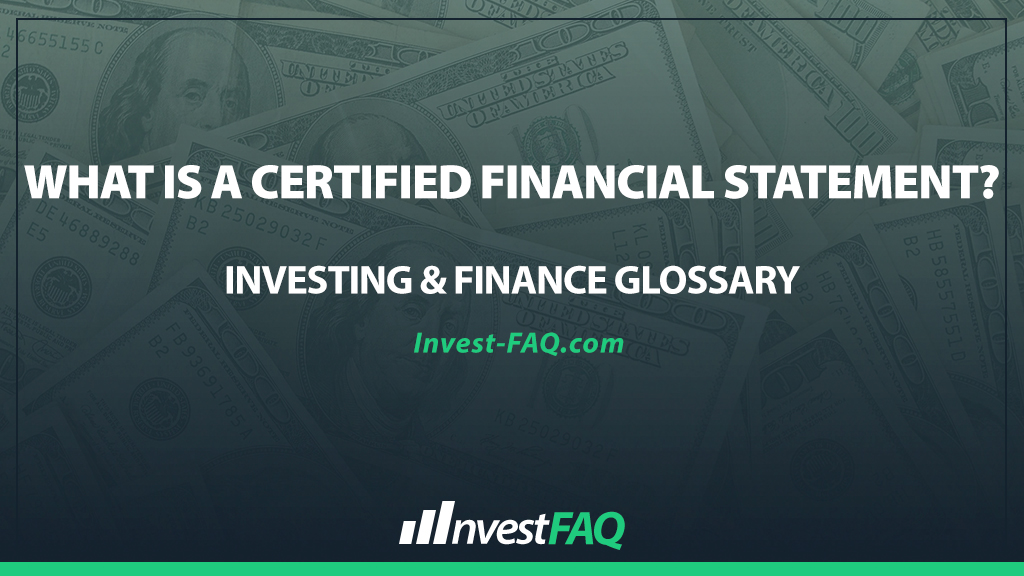
Certified Financial Statement
Contents
A certified financial statement is a financial report that has been audited and validated by an independent certified public accountant (CPA) or audit firm. It assures the accuracy and reliability of the information presented, reflecting the true financial condition and performance of a business.
Businesses use certified financial statements to provide stakeholders, including investors, lenders, and regulatory agencies, with an objective verification of their financial status.
These documents are crucial for securing financing, building investor confidence, and complying with regulatory requirements.
The certification signifies that the financial statements conform to generally accepted accounting principles (GAAP) and that any material issues impacting the financials have been adequately disclosed.
Example of a Certified Financial Statement
“GreenTech Innovations,” a renewable energy company, prepares its annual financial statements, including the balance sheet, income statement, and cash flow statement. To enhance credibility and fulfill regulatory obligations, GreenTech engages an independent CPA firm to audit these statements.
Pre-Audit: GreenTech’s internal accounting team compiles the financial statements based on the company’s financial transactions throughout the year.
Audit Process: The CPA firm examines the statements, assesses financial practices, checks compliance with accounting standards, and verifies the accuracy of financial records.
Post-Audit: Upon completion, the CPA firm issues an auditor’s report, certifying the financial statements with an opinion on their fairness and conformity with GAAP.
In this scenario, the certification of GreenTech Innovations’ financial statements by the CPA firm adds a layer of trust and reliability, crucial for stakeholders making investment or lending decisions.
The audit process not only confirms the accuracy of the financial information presented but also evaluates the company’s internal controls and accounting practices, providing a comprehensive assessment of its financial health. This certification is instrumental in facilitating GreenTech’s access to capital and ensuring compliance with financial reporting standards.
Significance for Investing & Finance
The significance of certified financial statements in accounting and business operations encompasses several key aspects:
Enhanced Credibility: Certified statements assure stakeholders of the reliability and transparency of a company’s financial reporting.
Compliance and Oversight: They fulfill legal and regulatory requirements, aiding in compliance with securities laws and other financial regulations.
Risk Mitigation: The independent audit process helps identify and rectify any discrepancies or weaknesses in financial controls, reducing the risk of errors or fraud.
Decision-Making Support: Certified financial statements provide a solid foundation for making informed business decisions, supporting strategic planning, investment analysis, and risk management.
In summary, certified financial statements play a pivotal role in the business ecosystem, serving as a cornerstone of financial transparency and accountability.
By providing a verified account of a company’s financial status, these documents support compliance, enhance stakeholder confidence, and facilitate sound decision-making, ultimately contributing to the company’s success and stability.
FAQ
What distinguishes a certified financial statement from an uncertified one?
A certified financial statement has been audited and validated by an independent CPA or audit firm, ensuring its accuracy and compliance with accounting standards, unlike an uncertified statement, which hasn’t undergone such a rigorous external review.
Is it mandatory for all businesses to have their financial statements certified?
While not all businesses are required to have their financial statements certified, public companies, entities seeking financing, or those subject to regulatory scrutiny often need certified statements to meet legal, regulatory, or lender requirements.
How often should a business get its financial statements certified?
Businesses typically get their financial statements certified annually, though some may undergo quarterly reviews or audits based on regulatory requirements, investor demands, or internal policies for continuous financial oversight.
What can lead to a qualified opinion on a certified financial statement?
A qualified opinion is issued by an auditor when most of the financial statements are found to be in accordance with accounting standards, but there are certain areas or transactions where the auditor cannot obtain sufficient evidence or disagrees with the accounting treatment, indicating potential concerns or limitations in the financial data presented.
